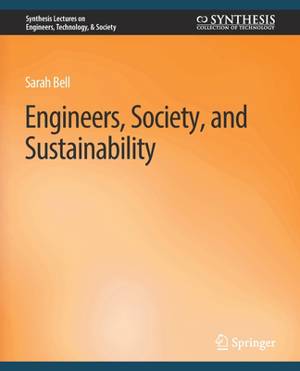
- Afhalen na 1 uur in een winkel met voorraad
- Gratis thuislevering in België vanaf € 30
- Ruim aanbod met 7 miljoen producten
- Afhalen na 1 uur in een winkel met voorraad
- Gratis thuislevering in België vanaf € 30
- Ruim aanbod met 7 miljoen producten
Zoeken
Omschrijving
Sustainable development is one of the key challenges of the twenty-first century. The engineering profession is central to achieving sustainable development. To date, engineering contributions to sustainability have focused on reducing the environmental impacts of development and improving the efficiency of resource use. This approach is consistent with dominant policy responses to environmental problems, which have been characterised as ecological modernisation. Ecological modernisation assumes that sustainability can be addressed by reforming modern society and developing environmental technologies. Environmental philosophers have questioned these assumptions and call into question the very nature of modern society as underlying the destruction of nature and the persistence of social inequality. Central to the crises of ecology and human development are patterns of domination and the separation of nature and culture. Engineering has a clear role to play in ecological modernisation, but its role in more radical visions of sustainability is uncertain. Actor-network theory provides an analysis of socio-technical systems which does not require the separation of nature and culture, and it provides a way of thinking about how engineers are involved in shaping society and its relationship to the environment. It describes the world in terms of relationships between human and non-human actors. It shows that social relationships are mediated by technologies and non-human nature, and that assumptions about society and behaviour are ""baked-in"" to technological systems. Modern infrastructure systems are particularly important in shaping society and have significant environmental impacts. Modern infrastructure has allowed the consumption of resources far beyond basic human needs in developed countries. Failure to deliver infrastructure services has resulted in billions of the world's poorest people missing out on the benefits of modern development. Engineers have an importantrole to play in developing new infrastructure systems which acknowledge the relationships between technology and society in shaping demand for resources and environmental impacts, as well as alleviating poverty. Engineers have an important role in mediating between the values of society, clients, the environment and the possibilities of technology. Constructive Technology Assessment and Value Sensitive Design are two methodologies which engineers are using to better account for the social and ethical implications of their work. Understanding engineering as a hybrid, socio-technical profession can help develop new ways of working that acknowledge the importance of technology and infrastructure in shaping social relationships that are central to achieving sustainability. Table of Contents: The Origins of Sustainability / Ecological Modernisation / Environmental Ethics / Society and Technology / Engineering Consumption / Sustainable Urban Water Systems / Engineering, Technology and Ethics / Conclusion
Specificaties
Betrokkenen
- Auteur(s):
- Uitgeverij:
Inhoud
- Aantal bladzijden:
- 95
- Taal:
- Engels
- Reeks:
Eigenschappen
- Productcode (EAN):
- 9783031009822
- Verschijningsdatum:
- 10/08/2011
- Uitvoering:
- Paperback
- Formaat:
- Trade paperback (VS)
- Afmetingen:
- 190 mm x 235 mm
- Gewicht:
- 204 g

Alleen bij Standaard Boekhandel
+ 69 punten op je klantenkaart van Standaard Boekhandel
Beoordelingen
We publiceren alleen reviews die voldoen aan de voorwaarden voor reviews. Bekijk onze voorwaarden voor reviews.







